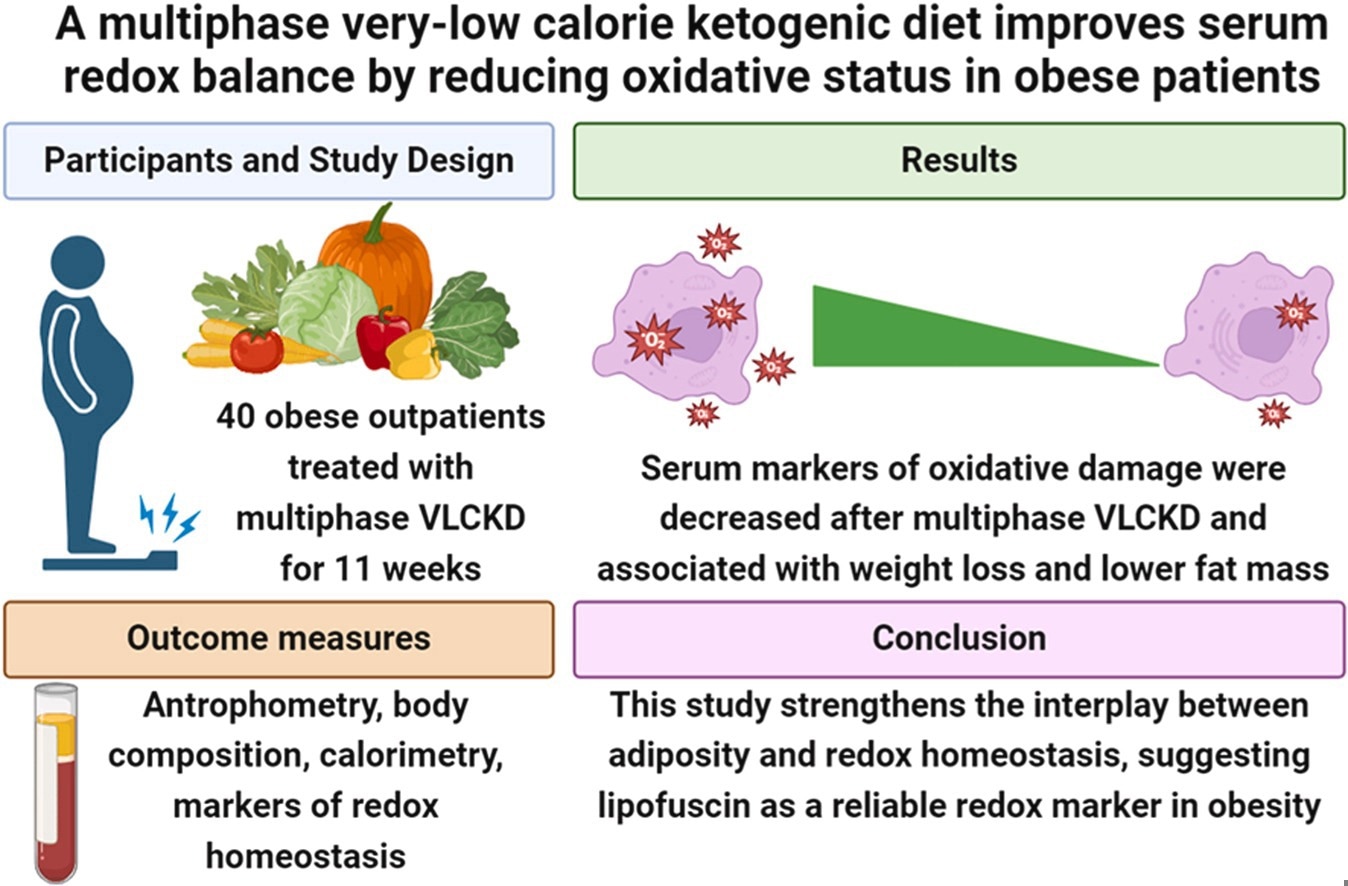Obesity has become a major public health concern because of its severe adverse health effects. Obesity, which is characterized by excessive accumulation of fat, is associated with a reduction of 5–20 years of life expectancy and an increased risk of various non-communicable diseases, including cardiovascular and metabolic diseases and certain cancer types.
Evidence indicates that obesity-related complications can be reduced by achieving a 5-10% body weight loss. Various lifestyle interventions, such as healthy dietary habits and regular physical activities, have shown promising outcomes in weight management.
Calorie-restricted diets with high levels of nutraceuticals and phytochemicals have been found to reduce obesity-related complications and increase life expectancy through anti-inflammatory and antioxidant activities.
In this study, scientists have investigated the effectiveness of a multiphase, very-low-calorie ketogenic diet in maintaining the body’s redox status and influencing anthropometric and biochemical parameters.
Study design
The study was conducted on 40 adult individuals living with obesity. They were prescribed a multiphasic, very-low-calorie ketogenic diet for eleven weeks. Daily fiber, vitamin, and mineral intake were provided in accordance with international recommendations.
Anthropometric parameters, body composition parameters, calorimetric measures, and standard laboratory markers of glucose and lipid metabolism were evaluated at baseline and the end of the dietary intervention. Serum antioxidant status and levels of oxidative stress markers were also evaluated at both timepoints.

Important observations
The analysis of baseline characteristics identified dyslipidemia as the most frequent comorbidity among participants. All of them were physically active; however, their activity levels were low.
A significant improvement in body weight, body mass index (BMI), waist circumference, and waist-to-hip ratio was observed after the 11-week multiphase, very low-calorie ketogenic dietary intervention.
A lower obesity class was observed in the entire study population at the end of the intervention. A significant reduction in abdominal obesity was observed in 18% of participants.
A significant reduction in fat mass, fat-free mass, body water, and cell mass was observed after the 11-week intervention.
Regarding metabolic effects, the intervention was found to improve glucose and lipid metabolism, with no changes in serum total protein and albumin levels.
The analysis of oxidative stress markers and antioxidant status in serum and erythrocytes indicated that the 11-week intervention is capable of improving serum redox balance by reducing oxidative stress markers, including total oxidative status, lipofuscin, lipid hydroperoxides, and malondialdehyde (MDA).
Changes in anthropometric measurements, body composition, and glucose metabolism parameters were significantly associated with changes in serum markers of oxidative damage.
Further statistical analysis revealed that the change in serum lipofuscin level significantly predicted the changes in body mass index, fat mass, visceral adiposity, and insulin sensitivity. Similarly, the variations in serum MDA level and total oxidative status were identified as significant predictors of BMI and fat mass changes, respectively.
Study significance
The study finds that intake of a multiphase, very-low-calorie ketogenic diet for eleven weeks has positive health effects, as demonstrated by reduced body weight and fat mass and improved glucose and lipid metabolism. These positive health effects are associated with reduced serum oxidative stress markers and improved serum redox balance.
An average weight loss of approximately 18 kilograms was observed in participants. This could be attributed to reduced energy intake, protein-induced satiety, and hormone-regulated appetite control.
The average reduction in free fat mass, muscle mass, and total body water was 2.7 kilograms, 1.8 kilograms, and 2.0 kilograms, respectively, among participants after the 11-week dietary intervention.
A reduction in total body water could be due to increased water excretion (required for ketone body removal), reduced sodium intake, and liver and muscle glycogen depletion.
These observations suggest that the multiphase, very-low-calorie ketogenic diet is capable of reducing fat mass while maintaining lean mass in obese individuals.
A reduction in respiratory quotient without any changes in resting metabolic rate indicates a shift towards preferential lipid oxidation over carbohydrates for energy, optimizing oxygen metabolism. This metabolic adaptation is predictive of long-term weight maintenance and improved metabolic health.
Overall, the study highlights the interactions between adiposity, glucose metabolism, and redox homeostasis in the pathogenesis of obesity. The study also identifies serum lipofuscin as a reliable redox marker in obesity.